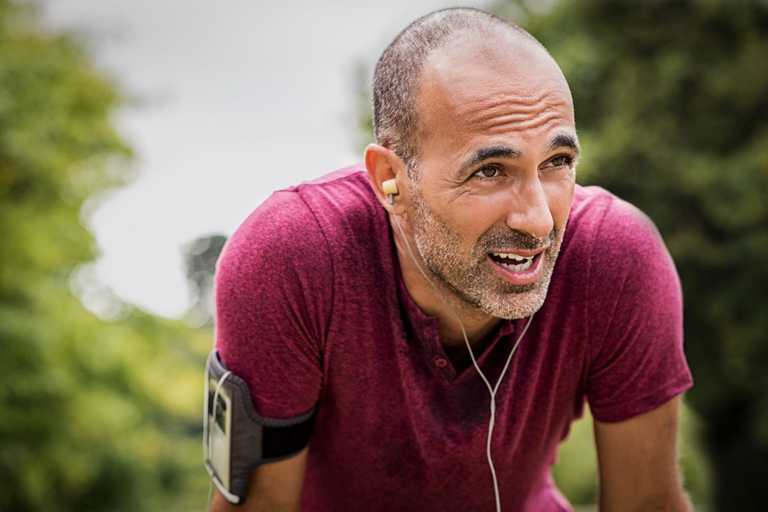
3T MRI for prostate
If you’re over 50 it’s important to check your prostate. At Prime Health we've developed a fast, accurate and ...

A prostate MRI (magnetic resonance imaging) scan is a diagnostic imaging technique that uses a magnetic field and computer-generated radio waves to create detailed images of the organs and tissues in your body.
Although no special preparation is required, if you are having an MRI scan of your prostate being aware of what is involved may help to reduce any anxiety and help you feel more at ease.
MRI is a valuable imaging technique for diagnosing a wide range of diseases and conditions. It allows doctors to view very detailed cross-sectional images to help in the diagnosis and planning of any necessary treatment for a variety of medical conditions, such as benign (non-cancerous) conditions such as an enlarged prostate and prostate cancer.
MRI is the gold standard for imaging the prostate. It provides a clear and detailed view of the prostate. MRI images of the body’s soft tissue are clearer and more detailed than other imaging methods and they can help detect abnormalities, detect disease and evaluate and monitor prostate cancer.
It will tell your referring physician the extent of a tumour and whether any tumour has spread beyond the prostate.
Your doctor may refer you for a Multiparametric (MPMRI) MRI of the prostate to help determine the cause of any symptoms you may be experiencing. This could be due to an abnormality being detected during a digital rectum exam, or if you have a blood test that shows a raised PSA (prostate-specific antigen) score.
A 3T Multiparametric MRI scan will help your doctor decide whether you need a prostate biopsy.
If only normal tissue is detected, then you are unlikely to have prostate cancer or require treatment and therefore may be able to avoid having a biopsy, and its possible side effects.
If cancer is detected, MRI can help identify whether cancer has spread outside of the prostate gland and the MRI will help your doctor use the scan images to decide which parts of the prostate to take a biopsy (sample) from in order for a target biopsy to be performed.
MRI is a non-invasive imaging technique that does not involve exposure to radiation.
An MRI scanner is essentially a giant circular magnet that produces a powerful magnetic field.
Extensive research has been undertaken on any biological effects it might cause and it has been determined that it is an extremely safe examination.
You will need to complete an MRI safety questionnaire before having your MRI scan to ensure you do not have any implants that could be affected by the magnet.
You must tell your doctor or radiologist if you have a cardiac pacemaker, an artificial metallic heart valve, inner ear implants, or surgical clips within the head as it may not be possible for you to have an MRI scan.
Other imaging methods will be provided if this is the case. Other imaging methods such as ultrasound are available for people who are unable to have an MRI scan of the prostate.
Here is a checklist of questions you may have and what to expect when coming into Prime Health for an MRI scan of your prostate.
You can eat and drink as normal. There is no need to fast beforehand.
You should continue to take any prescribed medication as normal.
It is generally advisable not to ejaculate for three days before your scan.
Loose, comfortable clothing is recommended. You will be asked to remove your shoes and change into a hospital gown. You can usually wear your underwear.
You will be asked to remove any jewellery or any metallic items. It is advisable to avoid wearing clothing with metal in (zips, studs and metallic microfibres for example), as you will be asked to remove these.
Before your appointment, you will be sent arrival instructions along with confirmation of the time and date. These instructions may differ depending on where you are having your scan.
When you arrive at the centre please check in with the reception team.
During your appointment, you will be looked after by a specialist team of radiographers and healthcare professionals.
Just before you have your scan, you will be asked to confirm some details, including your identity and that you are happy to go ahead.
Before signing the patient questionnaire the radiographer needs to ensure that you understand what an MRI scan is, what to expect and the possible risks.
The questionnaire will cover this, but please ensure that you have informed the radiographer if you:
The team will show you into the scanner room and will help you get into the correct position on the couch.
They will use pads and pillows to help make you comfortable so that you can remain still during the scan.
The majority of people having a multi-parametric prostate MRI will receive an intravenous contrast medium (dye).
This involves the injection of a dye to help produce more detailed images. The dye is injected into a vein in your arm, which can make you feel a bit warm for a short while.
If you need a contrast medium, you may also need to have a blood test before your scan as a precaution and to check your kidney function and whether the use of contrast is appropriate.
An MRI scanner is a large cylinder-shaped tube which is approximately four feet long and is open at both ends.
During the scan, the couch is moved so that the prostate is in the centre of the scanner.
You will be offered headphones to listen to music or earplugs to wear because the machine makes a loud humming noise.
The team will be in the control room, and you will be able to talk to them via an intercom and they can see you on a screen.
During an MRI scan, you are required to keep completely still while the images are being taken as movement can make the images blurry.
If at any time during the scan you feel worried or uncomfortable, you can let the team know by using the buzzer and they will do what they can to help and reassure you.
The MRI scan itself usually takes around 40 minutes and your appointment from start to finish is likely to be about an hour.
After the scan, your MRI images will be reviewed and examined by a specialist radiologist who is responsible for producing a written report to send to your referring clinician.
If you have had an injection of contrast you will be advised to drink plenty of water (2-3 glasses) after your examination. This is to help flush the dye out of your system.
MRI is a valuable tool to aid the diagnosis of prostate cancer and preparing for your scan may help reduce anxiety.
The radiologists at Prime Health are all qualified doctors and specialise in urology, giving you, and your referring clinician confidence in the accuracy of your report.
At Prime Health we have more than 10 years of experience in accurately and effectively assessing prostate symptoms using MRI technology.
Over this period, we have developed a first-class, comprehensive private diagnostic service offering high-quality prostate scans.
You may be interested in reading more on:
Prostate MRI scan guide | Understanding diagnosis
Men’s full health check | Which screening tests do I need?
An overview of prostate cancer; the symptoms, diagnostic tests and treatment
To book your MRI scan today with Prime Health – Click here
If you’re over 50 it’s important to check your prostate. At Prime Health we've developed a fast, accurate and ...
The consultant urologists that work with Prime Health are among the best in the UK. They are backed by our fir...
A Prime Health personalised health check, will give you the information, advice and support you need to help y...
We’ve developed a streamlined, fast-track pathway which utilises our years of experience and expertise in accurately and effectively assessing prostate symptoms.
Don’t wait for a prostate assessment. Wait less, worry less.


